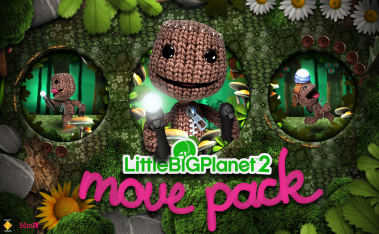By Joel Smart (The Cascade) – Email
Date Posted: October 11, 2011
Print Edition: October 5, 2011
 A nightmarish, rogue pastry is unleashed upon Craftworld when an experiment by chef/scientist Victoria von Bathysphere (to create a telekinesis-enabling “Brain Crane”) goes horribly, horribly wrong. “The Cakeling has risen.” This is the how the new DLC pack for critically-acclaimed platformer LittleBigPlanet 2 begins. But it isn’t the plot that has people talking, it’s the addition of new features to the game, including tools to create and share innovative motion-controlled levels in the game’s famously open-ended level editor (which includes all of the tools the developers use to create the actual story levels).
A nightmarish, rogue pastry is unleashed upon Craftworld when an experiment by chef/scientist Victoria von Bathysphere (to create a telekinesis-enabling “Brain Crane”) goes horribly, horribly wrong. “The Cakeling has risen.” This is the how the new DLC pack for critically-acclaimed platformer LittleBigPlanet 2 begins. But it isn’t the plot that has people talking, it’s the addition of new features to the game, including tools to create and share innovative motion-controlled levels in the game’s famously open-ended level editor (which includes all of the tools the developers use to create the actual story levels).
The PlayStation Move, Sony’s handheld motion controller, was released on September 17, 2010, and it has fared quite well with gamers, but the amount of creative ways to use the device has been relatively limited (which goes for the motion control systems of the Xbox 360 and Wii as well, for that matter). However, with the release of Rise of the Cakeling last month, available since September 14, all of that has begun to change.
LittleBigPlanet is well-known as a simple side-scrolling platformer with cute, homemade craft-like visuals. However, LittleBigPlanet 2 expanded its scope well beyond this conception, with new tools that allowed the developers and players to create top-down vehicle-racing levels, twin-stick shooters, Tetris-like minigames and so much more. It defies almost any genre or box that attempts to limit it. Adding to that, aspiring level designers often use the game to showcase their creativity and talent, with developer Media Molecule even hiring some of the best level creators to their staff. Regular players benefit from the almost-constant influx of new, quality levels waiting to be explored, rated and favourited.
Putting the tools to create motion-controlled levels into the hands of gamers is a revolutionary move. It has not been done before, especially in a game with such a robust editor and innovative level-sharing system (which allows you to easily find new, innovative, and high quality levels amongst the more-than-four-million levels). What it means is that choosing to invest in a Move controller now gives PS3 owners an infinite number of opportunities to use it.
The Move adds a ton of new (and varied) gameplay options. In some levels, it operates like a pointer or cursor on the screen. In one of the developer-made mini-levels in Rise of the Cakeling, called Jam Kerblam, players use the cursor to “pop” as many blocks as they can. A single click pops all the same-coloured blocks that are touching each other, while clicking “blast blocks” take out entire rows of blocks at a time. Accidentally popping a “Stun block” temporarily prevents players from clicking, causing the time-counter to drop.
The level possibilities really do seem endless. Some levels allow gamers to pick up objects or other players using the Brain Crane. This might include pulling back a slingshot-style platform to rocket a player forward, or holding onto an umbrella to deflect acid rain that would otherwise kill players. An entirely different function can be explored in Fast Food, a level that resembles classic “tilt maze” games. By carefully tilting the controller one way or another you can guide a gumball along a path, avoiding hazards and holes while traversing narrow pathways. Level designers can easily craft these levels, simply by using the Movinator, a tool that allows them to connect objects they create to specific controls – such as the various tilt functions of the Move.
The new pack also allows players to create and interact with levels in new ways. They can paint textures for their levels using the Move as a paintbrush, or even use device like a high-tech marionette to record movements of non-player characters in their levels (hugely simplified from the way characters were previously animated). On top of it all, the new DLC increases the way larger groups of friends can play together; up to seven inputs can now be utilized (such as four basic controllers, and three Moves).
With so many aspiring artists creating and collaborating on levels (and even themed level-packs) of their own, it is an exciting time in the history of motion control. Without the restrictions of market research and the monetary pressures faced by game designers in the industry, unhindered creativity and innovation will finally begin to tap into the true potential of motion-controlled gaming. It’s about time!

